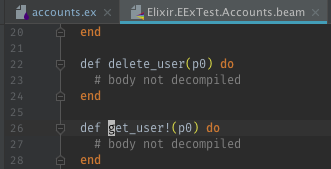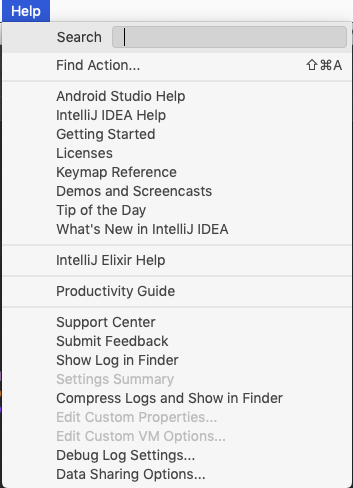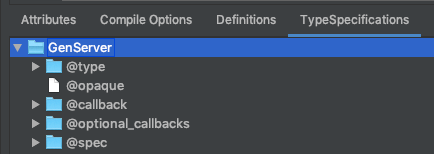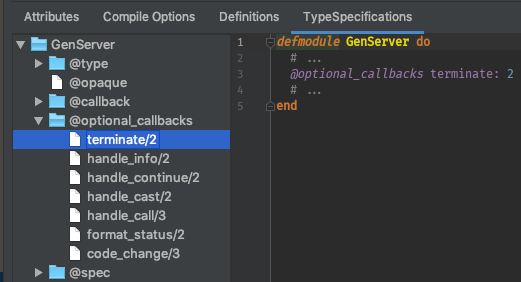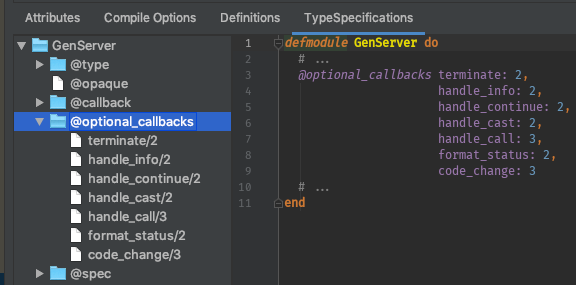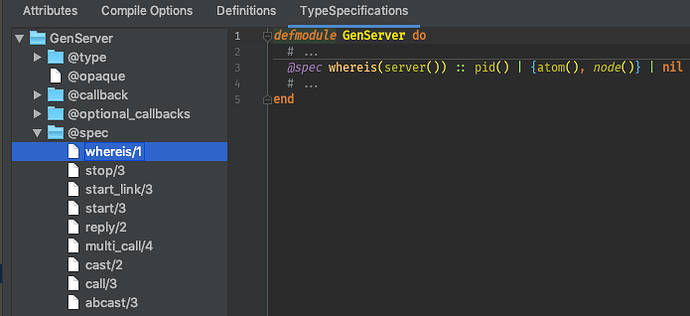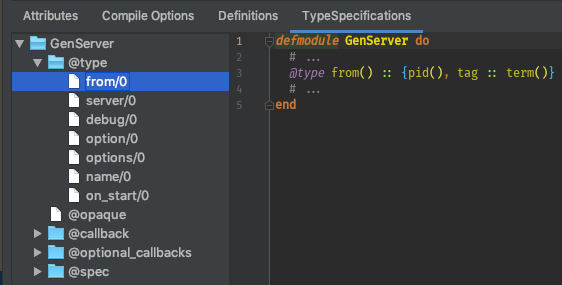Version 7.3.0
Donate
Thanks
- For reporting
StreamEx is missing nonNull on some IDEs/versions
Changelog
v7.3.0
Enhancements
- #1015 - @KronicDeth
- Add supplemental file editor for
.beam files: “BEAM Chunks”. The decompiled binary file will continue to be shown on the default “Text” editor tab.
- #1021 - @KronicDeth
-
Support for Remove incorrect wording regarding test cases · elixir-lang/elixir@23c7542 · GitHub
| Version |
Struct |
Started Event |
Finished Event |
%ExUnit.Test{} field |
| < 1.6.0 |
%ExUnit.TestCase{} |
:case_started |
:case_finished |
case |
| >= 1.6.0 |
%ExUnit.TestCase{} |
:module_started |
:module_finished |
module |
Because Elixir 1.6.0 could not introduce a breaking change, the < 1.6.0 events are fired, but resources/exunit/1.6.0/team_city_ex_unit_formatting.ex will ignore them and only convert the >= 1.6.0 events to TeamCity event used in the JetBrains Test Runner UI.
- #1018 - Expose Declarations > Functions and Declarations > Macros in Color Settings - @dimcha
Bug Fixes
- #1019 - Don’t use
StreamEx because support is inconsistent across IDEs - @KronicDeth
README.md Updates
.beam Files
.beam files are the compiled version of modules on the BEAM virtual machine used by Elixir and Erlang. They are the equivalent of .class files in Java.
.beam files are not detected purely by their file extension: the BEAM file format starts with a magic number, FOR1, that is checked for before decompiling.
.beam files have 2 editors registered: decompiled Text and BEAM Chunks

Decompression
If the .beam module was compiled with the compressed compiler directive, which in Erlang looks like
-compile([compressed])
and in Elixir looks like
@compile [:compressed]
then the outer file format is GZip (which is detected by checking for the gzip magic number, 1f 8b, at the start of the file) and the .beam will be (stream) decompressed before the .beam header is checked and the chunks decoded.
BEAM Chunks
.beam files are composed of binary chunks. Each chunk is formatted
| Offset |
+0 |
+1 |
+2 |
+3 |
| 0 |
Name (ASCII Characters) |
| 4 |
Length (`unsigned-big-integer`) |
| 8+ |
Chunk-Specific |
This format is generically referred to as Type-Length-Value
The BEAM Chunks editor tab is subdivided into further tabs, one for each chunk in the .beam file.

The tabs are listed in the order that the chunks occur in the .beam file.
Atom / AtU8
The Atom chunk holds LATIN-1 encoded atoms while AtU8 chunk holds UTF-8 atoms. There will only be one of these atom-related chunks in any given .beam file. AtU8 is used in newer versions of OTP that support UTF-8 atoms. AtU8 was introduced in OTP 20.
Format
| Offset |
+0 |
+1 |
+2 |
+3 |
| 0 |
atom count (`unsigned-big-integer`) |
| 4 |
length1 (`unsigned-byte`) |
bytes (for length1) |
| 4+length1+...+lengthn-1 |
lengthn (`unsigned-byte`) |
bytes (for lengthn) |
Tab
The Atom/AtU8 tab shows a table with the columns
| Column |
Description |
Source |
| Index |
1-based to match Erlang convention. In the Code chunk, atom(0) is reserved to always translate to nil |
Derived |
| Byte Count |
The byte count for the atom’s bytes |
Raw |
| Characters |
From encoding the bytes as LATIN-1 for Atom chunk or UTF-8 for AtU8 chunk |
Derived |
Attr
The Attr chunk holds the module attributes, but only those that are persisted. Erlang module attributes are persisted by default, but in Elixir module attributes need to be marked as persisted with Module.register_attribute/3
Format
The Attr chunk uses External Term Format (term_to_binary’s output) to encode a proplist, which is similar to, but not quite the same an Elixir Keyword list
All modules will have a :vsn attribute that is either set explicitly or defaults to the MD5 of the module.
Tab
The Attr tab shows a table with the columns
| Column |
Description |
Source |
| Key |
Attribute name |
Raw |
| Value |
Attribute value. Note: The value always appears as a list as read from the binary format. I don’t know why. |
Raw |
CInf
The CInf chunk is the Compilation Information for the Erlang or Erlang Core compiler. Even Elixir modules have it because Elixir code passes through this part of the Erlang Core compiler
Format
The CInf chunk uses External Term Format (term_to_binary’s output) to encode a proplist, which is similar to, but not quite the same an Elixir Keyword list
Tab
The CInf tab shows a table with the columns
| Column |
Description |
Source |
| Key |
Option name |
Raw |
| Value |
Inspected value |
Raw |
Code
The Code chunk contains the byte code for the module.
Format
It is encoded in BEAM Compact Term Encoding, which differs from the binary format produced by term_to_binary.
Tab
The Code tab shows a read-only editor with one byte code operation on each line. For ease of reading, operations are grouped by function and then label block with indentation indicating scope.
By default as many references to other chunks and references to other parts of Code chunk are inlined to ease understanding. If you want to see the raw byte code operations, you can turn off the various inliners.
####### Controls
| Control |
On |
Off |
| Inline Atoms |
atom(0) is inlined as nil
|
atom(N) if "Inline Integers" is Off
|
atom(n) looks up index `n` in `Atom`/`AtU8` chunk and inlines its `inspect`ed version
|
N if "Inline Integers" is On and the argument supports "Inline Integers"
|
| Inline Functions |
literal(n) looks up index n in FunT chunk and inlines the name if the argument supports "Inline Functions"
|
literal(n) if "Inline Integers" is Off
|
n if "Inline Integers" is On and the argument supports "Inline Integers"
|
|
Inline Imports
|
literal(n) looks up index n in ImpT and inlines it as a function reference: &module.name/arity if argument supports "Inline Functions"
|
literal(n) if "Inline Integers" Is Off
|
n if "Inline Integers" is On and the argument supports "Inline Integers"
|
| Inline Integers |
atom(n) and literal(n) inline as n if argument supports "Inline Integers" |
atom(n), integer(n), and literal(n) |
integer(n) inlines as n |
| Inline Labels |
label(n) inlines as n if argument supports "Inline Labels" |
label(n) |
| Inline Lines |
line(literal(n)) looks up index `n` in the "Line Reference" table in the `Lines` chunk. The Line Reference contains a file name index and line. The file name index is looked up in the "File Name" table in the `Lines` chunk. The line from the Line Reference and the File name from the "File Name" table are inlined as `line(file_name: file_name, line: line)`. |
line operations are left as is |
| Inline Literals |
literal(n) looks up index n in LitT chunk and inlines its `inspect`ed version if the argument supports "Inline Literals" |
literal(n) |
| Inline Local Calls |
label(n) finds label(n) in Code chunk, then searches back for the previous func_info operation, then inlines it as a function reference: &module.name/arity if argument supports "Inline Local Calls" |
label(n) |
| Inline Strings |
Looks up bit_length and byte_offset into `StrT` chunk as their CharList value if supported by operation as value to string argument name |
bit_length and byte_offsetarguments are left as is |
| Show Argument Names |
Adds keyword argument names before each argument value |
Leaves values as positional arguments |
If any of the inliners are incorrect or you have an argument name that makes more sense, please open an issue.
Dbgi
The Dbgi chunk contains Debug Info. It was introduced in OTP 20 as a replacement for the Abst chunk. While the Abst chunk was required to contain the Erlang AST, the Dbgi format can contain the debug info for other languages, such as Elixir quoted form AST.
Format
Because the format is language neutral, the format is a set of nested, versioned formats. The outer most layer is
{:debug_info_v1, backend, metadata | :none}
For :debug_info_v1, Elixir’s backend is :elixir_erl. The metadata for :elixir_erl is further versioned: {:elixir_v1, map, specs}.
map contains the bulk of the data.
| Key |
Value |
:attributes |
Attributes similar to the Attr chunk, but at the Elixir, instead of Core Erlang level. Usually they match with the exception that attributes doesn’t contain vsn when Attr contains the MD5 version |
:compile_opts |
Compilation options similar to CInf chunk’s options key, but at for Elixir, instead of Core Erlang level. |
:definitions |
The Elixir quoted AST for reach function clause. |
:file |
The name of the file the module was generated from. |
:line |
The line in :file where the module was defined, such as the line defmodule occurred. |
:module |
The name of the module as an atom |
:unreachable |
Unreachable functions |
Tab
The Dbgi tag show the single value map entries: :file, :line, and :module.

For the multi-value keys: :attributes, :compile_opts, and :definitions, there are individual tabs.

####### Attributes
The Attributes tab has the same format as the Attrs chunk.
####### Compile Options
The Compile Options tab is usually empty, much like the CInf options key for Erlang.

####### Definitions
The Definitions tab is split between a tree of Module, Function/Arity and clauses.
Clicking on a clause will show only that clause, but clicking on a higher level in the tree will show all clauses in the function or the entire Module.
The AST stored in the definitions tab and the process of converting it back to code is not format preserves, so it will not look precisely like the source code as the AST has undergone some macro expansion before its put in the Dbgi chunk. As common idioms are understood, reversals will be add to the renderer.
ExDc
The ExDc chunk stores ExDoc. Not the rendered HTML from the ex_doc package, but the the @doc, @moduledoc, and @typedoc attribute values that work even without ex_doc installed. This chunk is what is consulted when the h helper is used in iex.
Format
The ExDc chunk is the encoded with term_to_binary. The term format is a versioned as {version, versioned_format}. The current version tag is :elixir_docs_v1 and the versioned_format is a Keyword.t with keys matching the Code.get_docs/2 tags :callback_docs, :docs, :moduledoc, and :type_docs keys.
Tab
Like Dbgi, the ExDc tab is split between a tree to navigate and an editor to show the decompiled value.
Click on a node in the tree will show all docs at that level and any descendants.
| Node |
Description |
| Root |
All docs |
| Module |
@moduledoc |
| Types |
All @typedocs |
| Types child |
A specific @typedoc |
| Callbacks |
All @callback @docs |
| Callbacks child |
A specific @callback’s @doc |
| Functions/Macros |
All @docs for functions/macros |
| Functions/Macros child |
A specific function/macro’s @doc |
ExpT
The ExpT chunk is the Export Table. The name “Export” derives from the Erlang module attribute -export, which is used to “export” functions from a module. It is the equivalent of making a function or macro public with def and defmacro as opposed to making it private with defp and defmacrop in Elixir.
Format
The BEAM format and the ExpT chunk, being made for Erlang, has no concept of macros. It only understands functions, so Elixir macros, like __using__/1 called by use are compiled to plain Erlang functions with MACRO- prefixed to their name and an extra argument (the __CALLER__ environment) as the first argument, which increases the arity, yielding a full MFA of MACRO-__using__/2 as seen above.
Tab
The ExpT tab shows a table with the columns
| Column |
Description |
Source |
| Atom Index |
Index into the Atom or AtU8 chunk for the function’s name |
Raw |
| Name |
The atom referenced by “Atom Index” |
Derived |
| Arity |
The arity (argument count) of the function |
Raw |
| Label |
Label index in the Code chunk where the function is defined. This label is usually immediately after the func_info operation and before the first pattern match or guard operation. |
Raw |
ImpT
The ImpT chunk is the Import Table. It DOES NOT encode just the Erlang -import attributes or Elixir import macro calls: it tracks any external function or macro called from another module. call_ext_* operations in the Code chunk don’t store the Module and Function (MF) of the function they will call directly in the bytecode, instead, one of the arguments is an index into the ImpT chunk. This way, all external calls are normalized into the ImpT chunk instead of being denormalized to the call site. The arity still appears at the call site to help with checking the argument count.
Format
You may notice that erlang.byte_size/1 is included in the table. This is because even BIFs are referenced by MFA and not a pre-assigned number as would be the case for system calls in operating systems like Linux. BEAM is like an Operation System, but not in all ways.
Tab
The ImpT tab shows a table with the columns
| Column |
Description |
Source |
| Index |
0-based index used by references in the Code chunk. |
Derived |
| Module Atom Index |
Index into the Atom or AtU8 chunk for the Module’s name |
Raw |
| Module Atom |
The atom referenced by “Module Atom Index”. |
Derived |
| Function Atom Index |
Index into the Atom or AtU8 chunk for the functon’s name |
Raw |
| Function Atom |
The atom referened by “Function Atom Index”. |
Derived |
LitT
The LitT chunk contains literals loaded as arguments in Code chunk.
Format
Confusingly, in the Code chunk sometimes the literal(N) term is used to encode integer N, an index into another chunk, or an actual index into the LitT. How literal terms are handled is completely dependent on the specific operation, so without having outside knowledge about the bytecode operation arguments for BEAM, the best way to figure out if literal terms are an integer or an index is to toggle the various controls in the Code tab to see if literal with no inlining turns into a LitT literal, FunT function reference, ImpT function reference, or integer.
Tab
The LitT tab shows a table with the columns
| Column |
Description |
Source |
| # |
0-based index used by references in the Code chunk. |
Derived |
| Term |
The equivalent of `raw |
> binary_to_term() |
Line
The Line chunk encodes both the file name and line number for each line(literal(n)) operation in the Code chunk. The n in line(literal(n)) is an index in to the Line References table in the Line chunk. This is used in Phoenix view modules to show where code from templates comes from.
Format
The Line chunk is composed of 2 subsections: (1) Line References and (2) File Names. First there is a header setting up the number of each entry to expect.
| Offset |
+0 |
+1 |
+2 |
+3 |
| 0 |
emulator version (`unsigned-big-integer`) |
| 4 |
flags (`unsigned-big-integer`) |
| 8 |
Line Instruction Count (`unsigned-big-integer`) |
| 12 |
Line Reference Count (`unsigned-big-integer`) |
| 16 |
File Name Count (`unsigned-big-integer`) |
####### Line References
This uses the Compact Term Format used for the Code chunk. The format ends up producing {file_name_index, line} pairs using the following algorithm:
| Term |
Interpretation |
atom(n) |
Change file_name_index to n |
integer(n) |
Add {file_name_index, n} to end of Line References |
####### File Names
| Offset |
+0 |
+1 |
+2 |
+3 |
| 0 |
Byte Count (`unsigned-big-integer`) |
Bytes |
Tab
The Line tab has one subtab for each subsection in the tab. Each subsection has its own table.
LocT
The LocT chunk is the dual to the ExpT chunk: it contains all private functions and macros.
Format
You’ll notice entries like -__struct__/1-fun-0-, starts with - and have a / suffix with fun in it. This naming scheme is used for anonymous functions such as those defined with fn or the capture operator (&) in Elixir. Much like how macros don’t really exist and use a MACRO- suffix, anonymous functions/lambdas don’t exist, and instead use a distinct naming scheme -<PARENT_FUNCTION>/*fun*. Unlike MACRO-, which is an Elixir invention, anonymous functions/lambdas really being local named functions with derived names is also done in pure Erlang modules. Erlang’s anonymous functions are defined with fun, which is where the fun part of the naming scheme comes from.
Tab
The LocT tab shows a table with the columns
| Column |
Description |
Source |
| Atom Index |
Index into the Atom or AtU8 chunk for the function’s name |
Raw |
| Name |
The atom referenced by “Atom Index” |
Derived |
| Arity |
The arity (argument count) of the function |
Raw |
| Label |
Label index in the Code chunk where the function is defined. This label is usually immediately after the func_info operation and before the first pattern match or guard operation. |
Raw |
StrT
The StrT chunk contains all Erlang strings (that is, Elixir charlists) used in the Code chunk.
Format
The StrT chunk contains a single contiguous pool. These strings are used for byte code operations like bs_put_string. Not all strings appear in StrT. Some strings, including most Elixir strings (Erlang binaries) appear in the LitT chunk that holds literals. I’m not sure how the compiler determines whether to use StrT or LitT. I think it all depends on the byte code operation.
Instead of encoding the start and length of each string in the chunk itself, the start and length for any given string is passed as arguments to the byte code operations in the Code chunk. By doing this, shared substrings can be efficiently encoded in StrT.
Tab

Installation Instructions



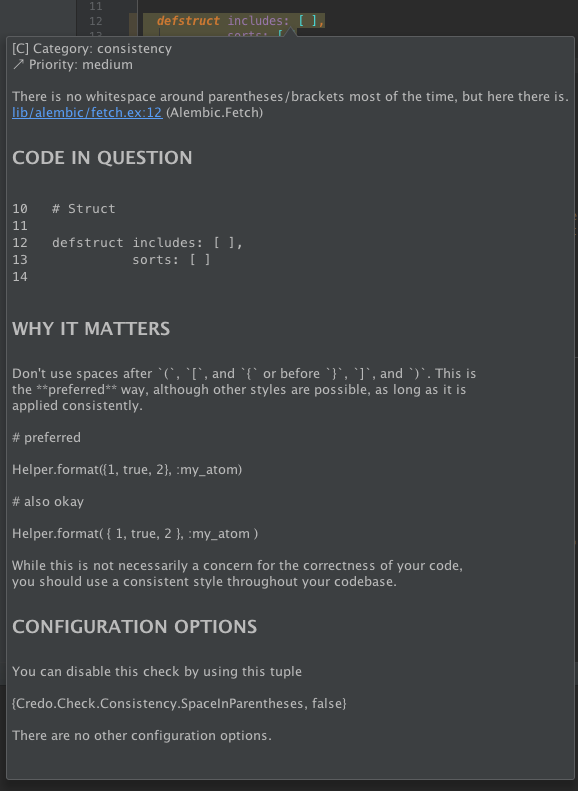
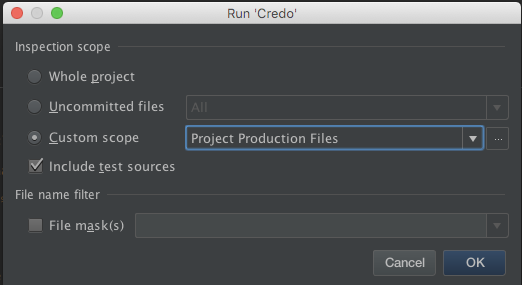




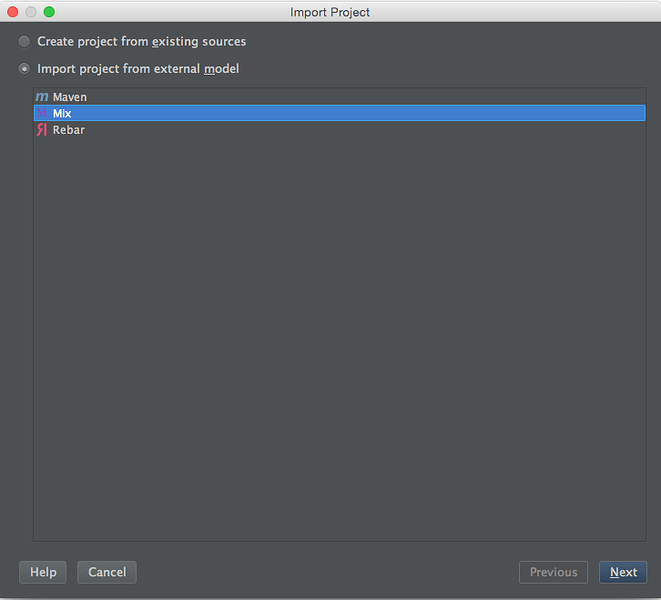
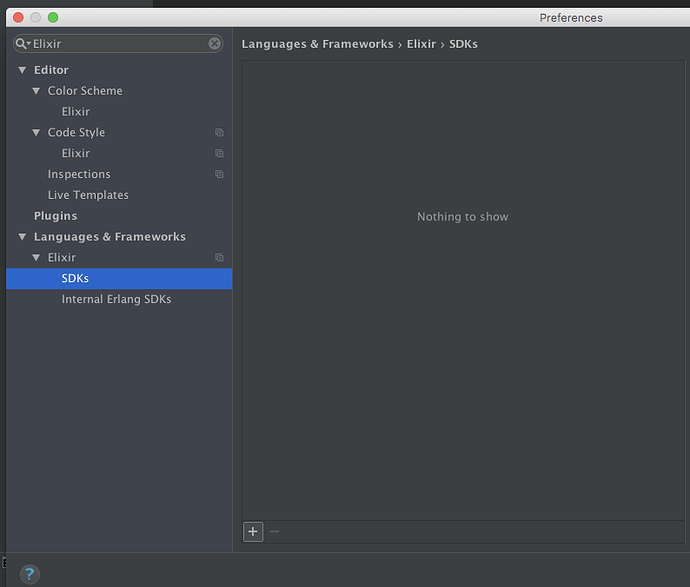
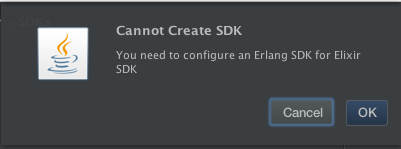
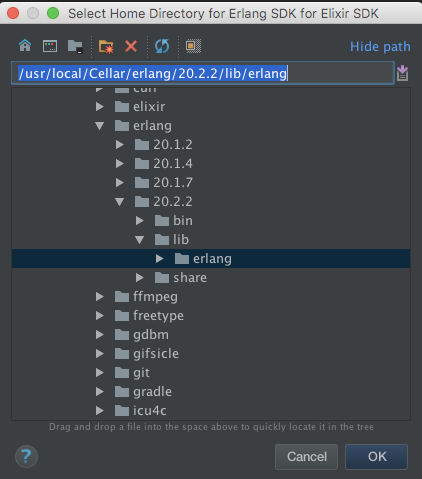
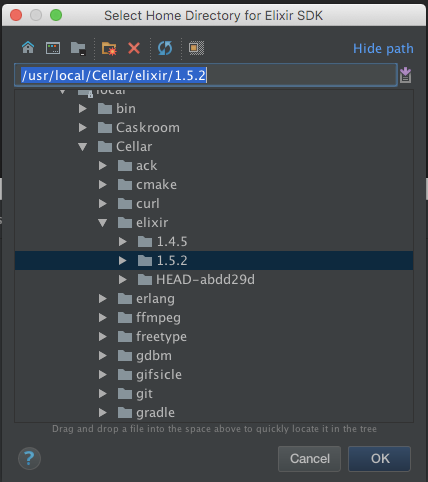
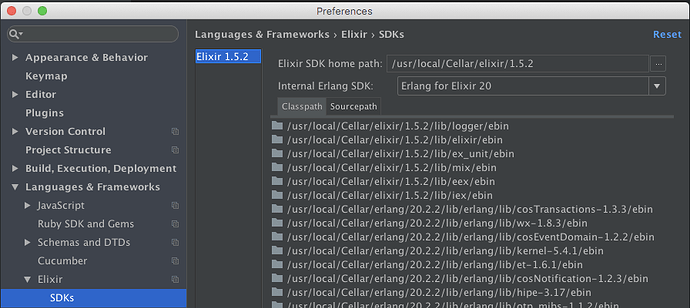
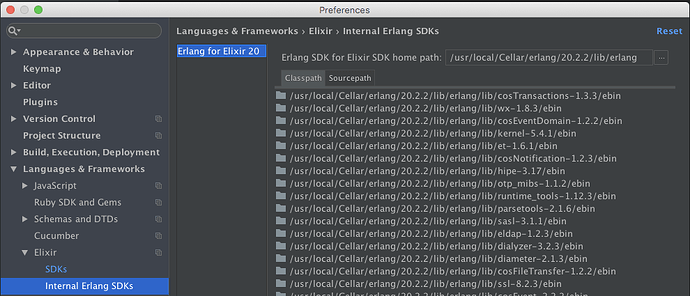







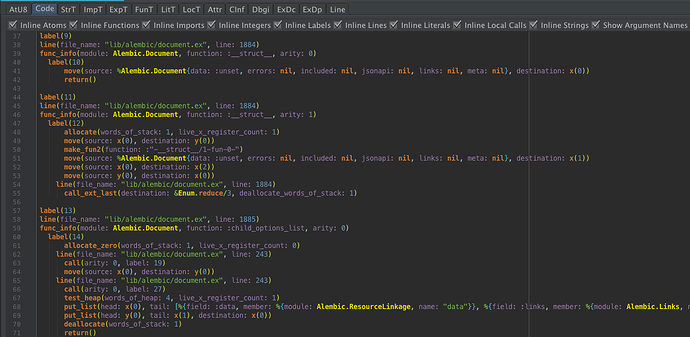

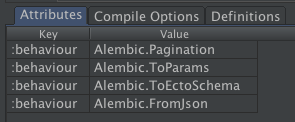

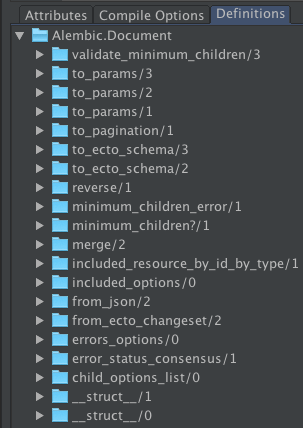


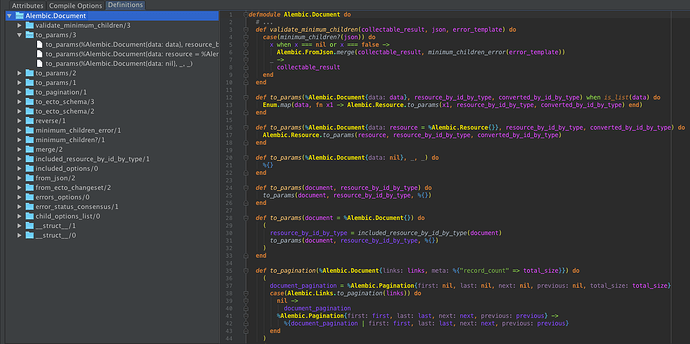
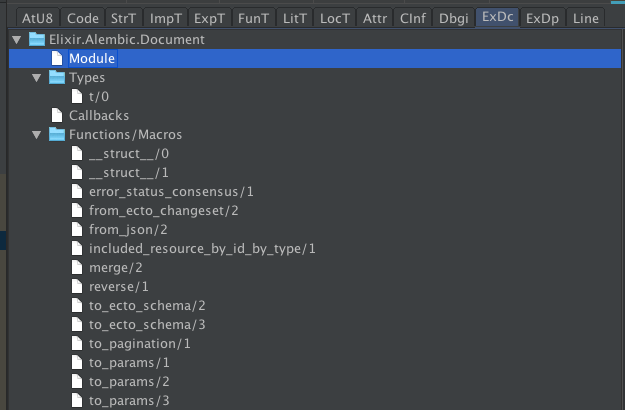
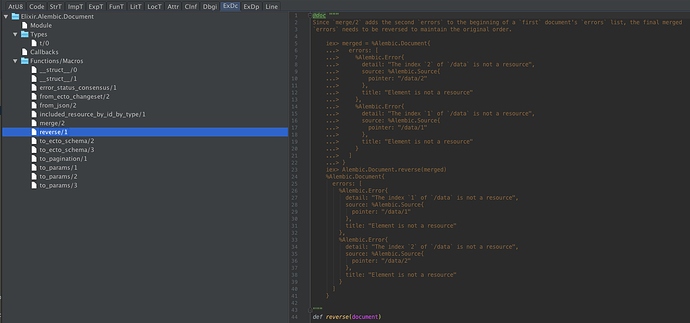
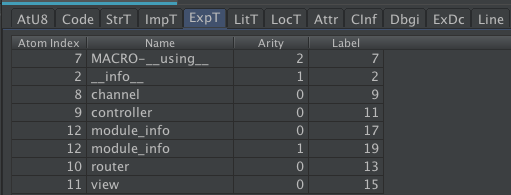
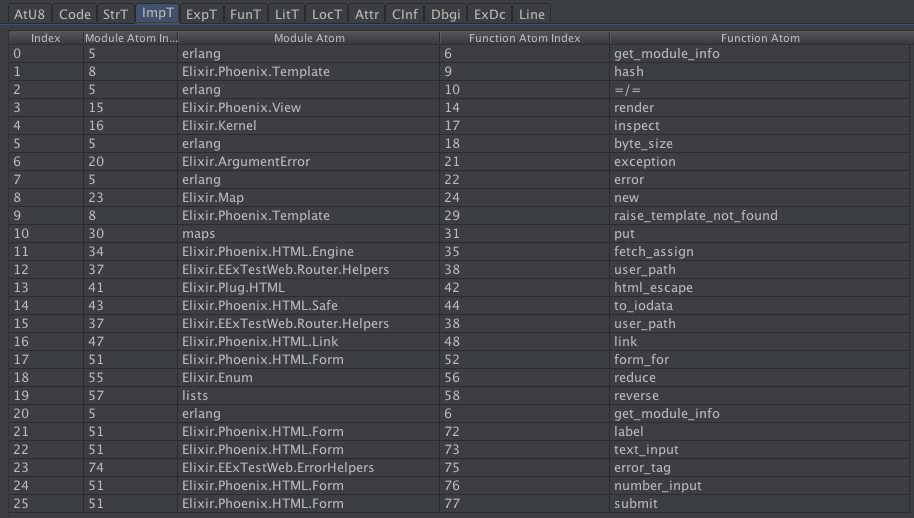

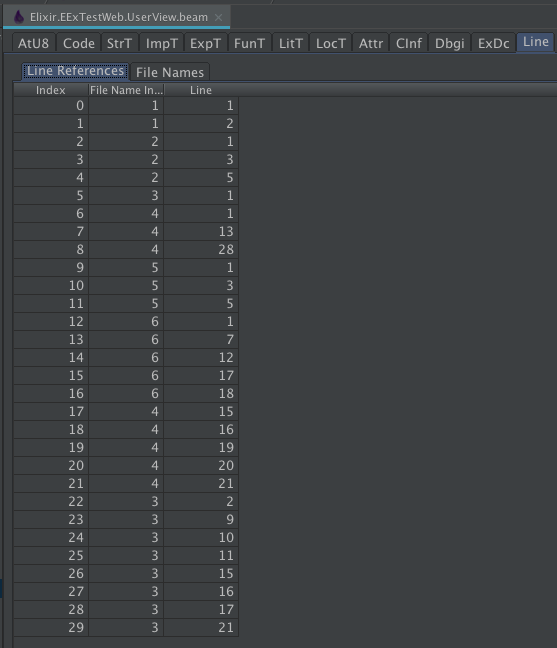
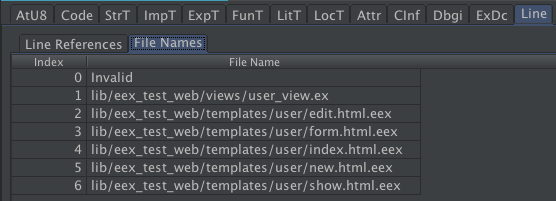
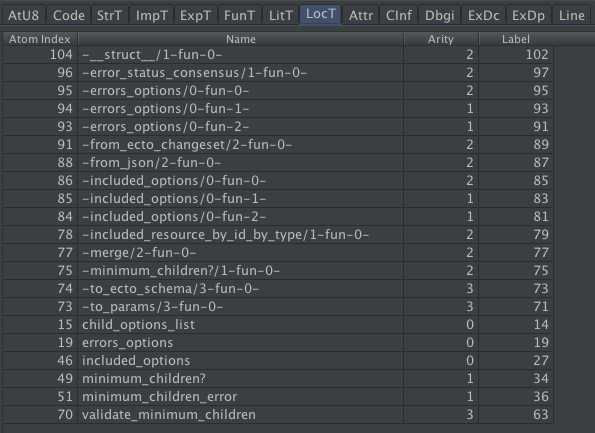


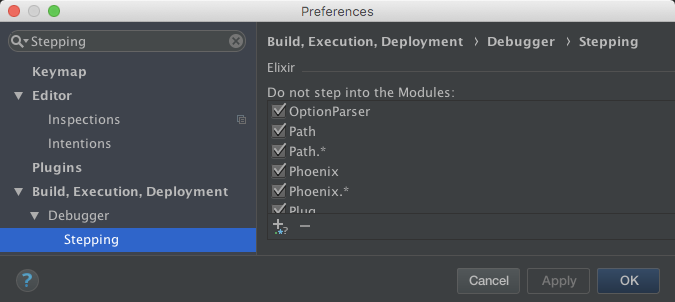
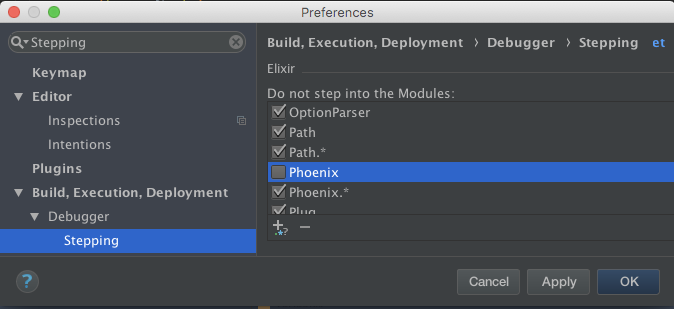


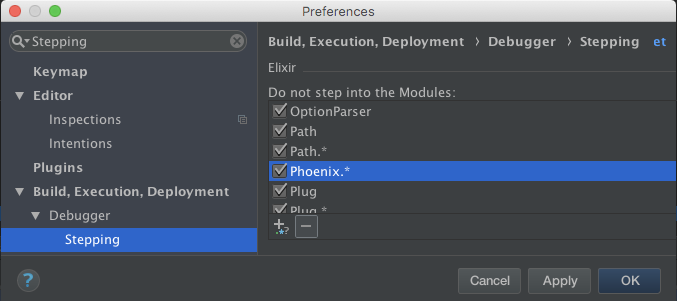

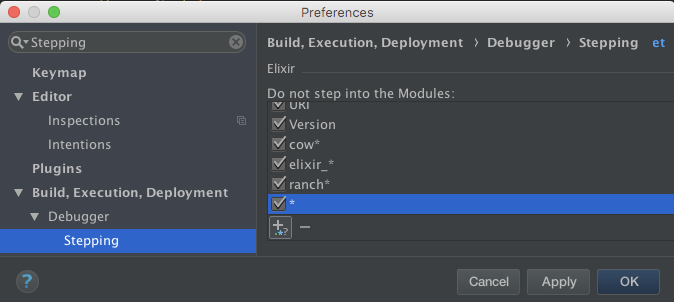
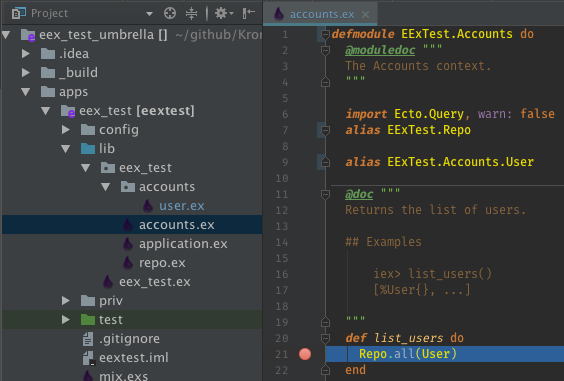
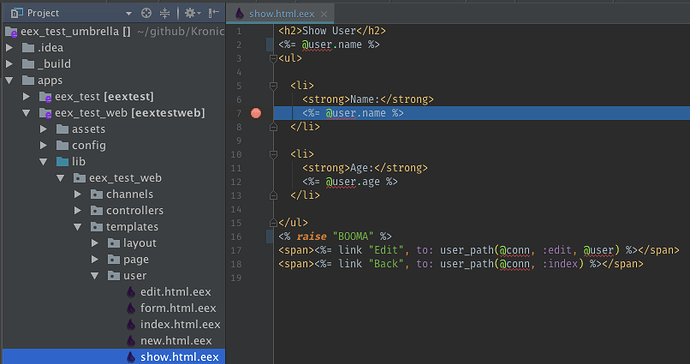
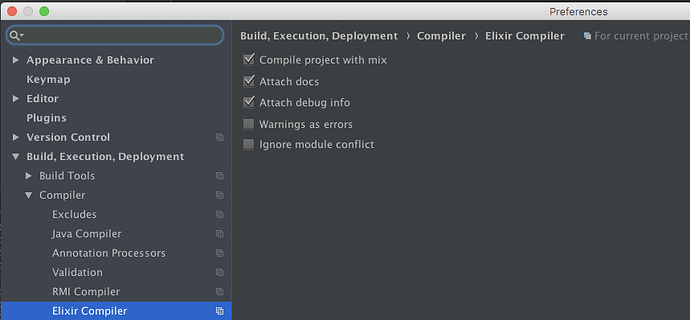
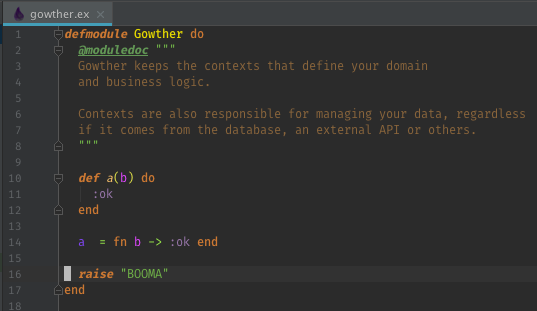

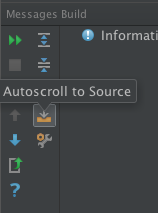

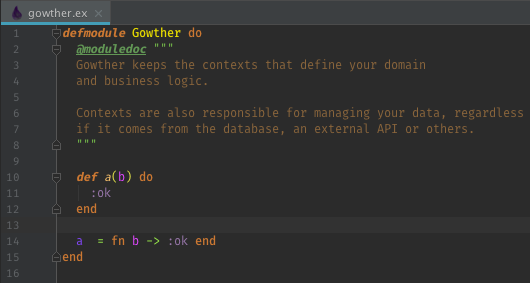



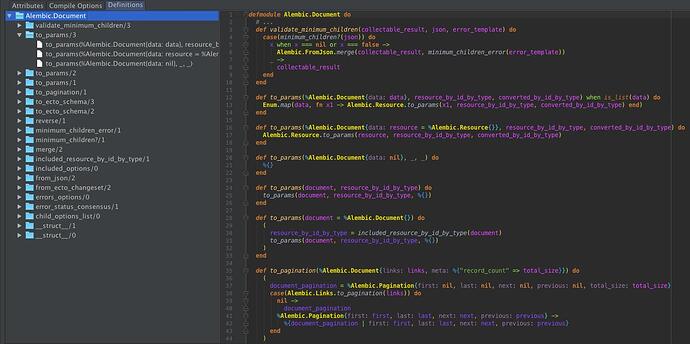
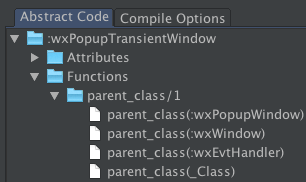

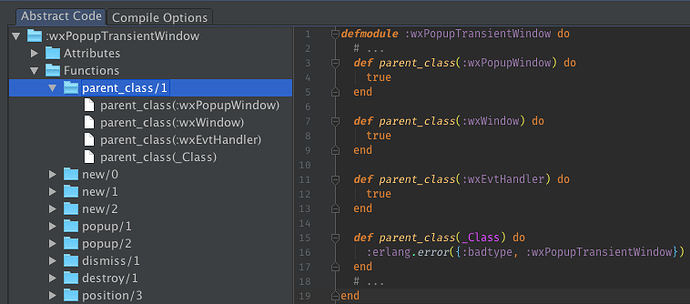
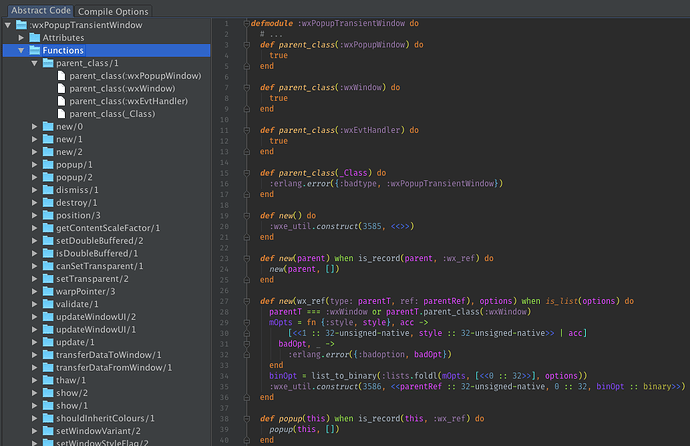
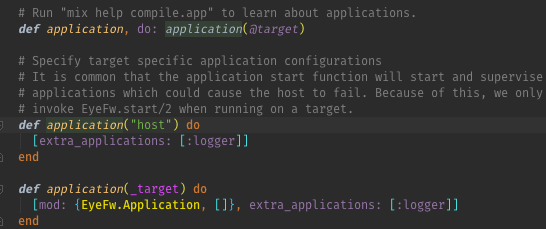
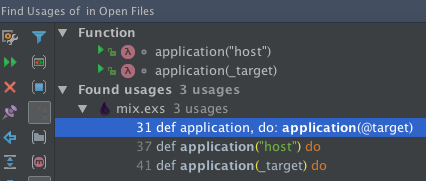
 )
)

